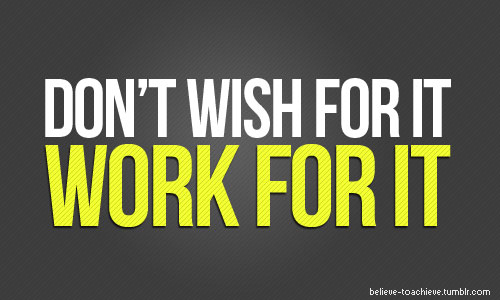Over the last few months I’ve begun to embrace this phrase. It started off as a way to remind myself to run an extra block (or at least limp through it), and then keep going. I figured I wasn’t going to get any healthier if I was lazy. So, I pushed myself to do my morning workouts by saying, “Don’t wish for it; work for it,” knowing full well that’s what it would take to get the dreams I have to come true.
The same thing applies to getting Insanitek running without my constant work.
I’m a lab monkey that would gladly spend more time in the lab analysing or in the field collecting things to analyse. Instead, I spend 90% of my time at a desk doing administrative things. There are huge lists of things to do, and that lists keeps growing. Admittedly, the list hasn’t gotten so bad that I have had to put “shower” on the list, though it is assumed as part of the morning routine. This was something I often had to put on my list to check off during my time in school, so I’m thankful for that.
No matter how long the list has gotten, I remind myself that it none of this will happen if I only wish for it; I must work for it. If anyone ever said that transitioning from working for someone to working for yourself was easy, they were lying. It’s easier when you are independently wealthy, but the reality of it is when you are not, then there is a nearly insurmountable amount of work to be done every day.
10,000 hours won’t do it.
For those of you that don’t know what the 10K hour concept is, you should check out Malcolm Gladwell‘s book Outliers. It highlights a psychology study from 1993 that looked at several beginners as well as a few proven experts in the field and decided how long people really needed to put in dedicated practise to become an expert at something. The verdict? About 10K hours. This will get you to above average and pretty damned successful. To get to be world class at something, you’d need to practise a lot more for a lot longer or have a lot of innate talent as well.
Granted, this is if you are aiming to compete against the entire world on the world’s stage. Having your own independent lab or company isn’t the same thing as beating out a world renown chess champion or playing violin better than Itzhak Perlman, so don’t sweat it too much. Regardless, you should be prepared to work more than 10K hours to get your independent company really off the ground if it’s going to be anything more than a side job.
So, what does it take? I’d say a bit of insanity is a good foundation to start on.

It’s called Obsessive Compulsive Disorder in some circles. In other’s it’s called determination to be better.
Clearly it takes a bit of madness to forge an alternative path. It’s normal for people to get stagnant and complacent in life. It’s normal for them to want to take the path of least resistance to whatever end. It’s normal to settle into a routine, want to break out of it occasionally, yet still feel perfectly OK with just being there.
Not for all of us though.
Is it possible to prepare mentally and physically for the long haul of creating dreams and alternative paths? Not completely, no. It’s a daily renewal and affirmation about what it is that you’re striving for. There will be days when you feel tired and need a (few) day(s) off. When you do, take that day unapologetically, then come back to it when you’re re-energized. After all, it is your schedule for your dream, and this is what its’ like to be the boss. Building your own company, whether you’re bootstrapping it up or have a huge savings account, is really a “what you put into it, you’ll get out of it” sort of adventure.
I have often found with my clients that in the beginning they will take a few days off from building their new path, then, they will slowly get back on it and work on it a few days, then jump back off again. Over time the time shortens upon their own volition. They will say, “I’m exhausted, so I’m building in a day off to sit around and do something else.” The next thing they know, halfway through the morning they feel better and are back at it. It’s then that we both know that they have reached that special form of madness that drives them forward to really creating a path all their own no matter how much effort and time it will take.
It may take more than 10,000 hours, but eventually it works out to where we become the best version of ourselves and choices we can be. This is when they stop wishing for it, and they start working for it. The difference is, at this stage, it barely feels like work because it’s something you are choosing to do.








